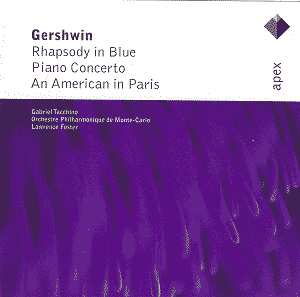Any time that a recording
is made of a famous composer’s best
known works, the results are going to
be subject to a high amount of critique.
For the attempt to be successful, the
performance must be flawless, the conductor
well-versed in the works presented,
the soloists inspired, and the recording
technically crystalline. Anything short
of absolute perfection lends the disc,
at best, a pedantic rehashing of a music-history
lesson; at worst it leads to the lower
realms of a collection instructive of
more what a disaster can be made of
audible noise rather than a tribute
to the ecstasy music can lead us to.
However, when done right, it reminds
the listener of why these are considered
the masterworks of the genius that created
them. Thus it was both with great anticipation
and trepidation that I approached the
Orchestre Philharmonique de Monte-Carlo’s
rendition of Rhapsody in Blue, Gershwin’s
Piano Concerto in F major, and An American
in Paris. Luckily for all involved,
it seems that the Apex recording under
review falls in the superior category,
standing as a musical tribute to the
genius of Gershwin.
The version of Rhapsody
in Blue presented is a joy to listen
to: Gabriel Tacchino performs with truly
outstanding virtuosity, and Lawrence
Foster lends an understanding of the
music and care to the pianist’s innuendo
and sensibilities. The tempos surge
to the edge of control without overstepping
the bounds of good taste or musicianship.
There is often a desire on the part
of the pianist to put everything on
display regardless of taste during the
more virtuosic sections of this work,
disregarding either the musical intent
or the content Gershwin provides. (Emile
Pandolfi’s recording of Rhapsody in
Blue with The Atlanta Symphony comes
to mind, for example.) However, Tacchino
manages to dance along the line of virtuosity
while never crossing into crass flashiness,
leading the listener through a stunning
display of his own technical skill while
never attempting to upstage the composer.
The only mistake made
is that the initial extended piano solo
is rearranged for no discernable reason
… there seems to be a removal of perhaps
90 seconds of piano solo in the middle
of the work. I do not know why that
edit was made, and believe that the
performance suffers through the absence.
However, that being said, Mr. Tacchino
still shines, even though his opportunity
is reduced, and the legs are cut out
from under the genius of Gershwin.
While Rhapsody in Blue
is certainly above average, the Piano
Concerto in F major is truly breathtaking.
All three movements are played flawlessly,
with the piano and symphony in perfect
symbiotic harmony. The details of the
jazz rhythms are given close care, properly
accenting the upbeats and adjusting
the written rhythms where so many orchestras
fall short. One must remember that Gershwin’s
music lives in the world of jazz as
well as the world of the symphony when
performing it. All too often, the conductor
either ignores half of the idiom or
shows no understanding of it, and the
orchestra sounds square. It is such
a relief not to be subjected to those
problems here. This recording should
be required listening to any conductor
or pianist considering doing any portion
of the Piano Concerto.
The recording of An
American in Paris is again excellent.
Mr. Foster should be given high praise
for his leadership. This is not an exact
parroting of the 1951 film score, but
is taken more as the orchestral suite
that Gershwin originally intended. It
is performed with great exuberance and
flair throughout. There are some minor
tuning problems in the saxophones and
clarinets that I noticed upon repeated
listening. They do not detract from
the overall work however, and I would
still rate this as a far above average
rendition.
I will concede that
of the five tracks, one could perhaps
find superior recordings of each individual
movement or piece. However, taken as
a whole, it would be difficult to best
this album. It is certainly deserving
of a place in any music collection.
Very highly recommended.
Patrick Gary
